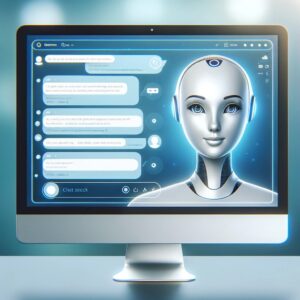The Role of AI Chatbots
In the rapidly evolving digital landscape, businesses are continually seeking innovative strategies to enhance customer service and improve operational efficiency. AI-powered chatbots, particularly those based on large language models (LLMs), are emerging as transformative tools in this quest. These intelligent systems are not just another technological advancement; they are redefining how businesses interact with customers, offering solutions that are not only efficient but also highly adaptive to the complex, evolving needs of modern consumers.

AI chatbots utilize advanced AI technologies, including machine learning and natural language processing, to simulate human-like interactions and decision-making processes. Historically, chatbots were simple, rule-based systems that could only respond to specific commands. Today, they have evolved into sophisticated AI-driven solutions capable of learning from interactions to improve their responses over time. This shift from a static to a dynamic interaction model allows businesses to deliver personalized customer service at scale.
The strategic advantages of implementing AI chatbots in customer service are significant and multifaceted. For one, they enhance customer interaction by providing instant responses to inquiries, regardless of the time of day. This around-the-clock availability ensures that customer needs are met promptly, which is crucial in today’s fast-paced world where delayed responses can lead to dissatisfaction and customer loss. Additionally, AI chatbots can handle a vast array of customer queries simultaneously, reducing wait times and increasing overall efficiency.
Cost Reduction and Efficiency Improvement

Furthermore, AI chatbots streamline operations and reduce costs by automating routine tasks that would otherwise require human intervention. This automation frees up human agents to handle more complex and nuanced customer service tasks, thereby optimizing the workforce and reducing operational costs. For example, Dukaan, an Indian start-up, laid off 90% of its customer service dep. The CEO claimed it reduced the time to first response from 1 minute 44 seconds to instant, and the resolution time from 2 hours 13 minutes to 3 minutes 12 seconds. It also reduced customer support costs by around 85%.
Technical Insights and Continuous Learning
On the technical front, AI chatbots operate by integrating seamlessly with existing customer relationship management (CRM) systems. They use APIs to access the necessary data and employ natural language processing to understand and respond to customer inquiries in a human-like manner. The continuous improvement feature of machine learning algorithms means that these chatbots learn from each interaction, becoming more intelligent and efficient over time. This capability to self-improve significantly enhances the chatbot’s ability to handle complex queries more effectively.
However, deploying AI chatbots is not without challenges. One of the primary hurdles is the initial setup and integration into existing systems, which can be both time-consuming and technically demanding. Additionally, training AI chatbots with quality data is crucial to ensure they perform as intended. Poorly trained chatbots may misinterpret customer queries and deliver unsatisfactory responses, potentially harming the customer’s experience.
Another challenge is maintaining a balance between automated interactions and human touch. Customers appreciate the efficiency of automated responses for routine inquiries but still expect a level of empathy and understanding that, so far, only human agents can provide. This necessitates a hybrid model where chatbots handle standard queries and human agents step in for more complex issues, ensuring that the quality of service remains high.
The Future of AI in Customer Service
Looking to the future, AI chatbots are set to become even more integrated into business strategies. Emerging trends suggest that future chatbots will possess predictive analytics capabilities, allowing them to anticipate customer issues and initiate proactive interactions. Such advancements could transform customer service from reactive to predictive, further enhancing customer satisfaction and loyalty.
To get started with AI chatbots, businesses need to carefully assess their current customer service processes and identify areas where automation could be most beneficial. Choosing the right AI chatbot solution that aligns with specific business needs is crucial, as is partnering with technology providers who offer robust support and customization options.

Sounds like a good idea?
Do you think your business would benefit from AI Customer Service? Consider scheduling a consultation with our experts to explore how customer chatbots can be tailored to meet your business needs.
Leveraging the power of AI, your business can achieve not just enhanced efficiency and customer satisfaction, but also a significant competitive edge in the marketplace.

